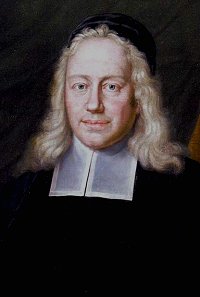Introduction
Born: March 22, 1663, Lübeck, Germany.
Died: June 8, 1727, Halle, Germany.
Buried: Stadtgottesacker, Halle, Germany.

Born: March 22, 1663, Lübeck, Germany.
Died: June 8, 1727, Halle, Germany.
Buried: Stadtgottesacker, Halle, Germany.

Augustus was the son of Johann Francke, a Lübeck lawyer, and Anna Gloxin (daughter of the mayor of Lübeck), and husband of Anna Magdalena Wurm.
He was educated at the Gymnasium in Gotha before studying at the universities of Erfurt and Kiel—where he came under the influence of the pietist Christian Kortholt—and finally Leipzig, where he shared rooms with Joachim Lange.
During his student career he made a special study of Hebrew and Greek; and in order to learn Hebrew more thoroughly, he for some time put himself under the instructions of Ezra Edzardi at Hamburg. He graduated at Leipzig, where in 1685 he became a Privatdozent.
A year later, with the help of his friend P. Anton, and with the approval and encouragement of Philipp Jakob Spener, he founded the Collegium Philobiblicum, where a number of graduates met regularly for systematic Bible study.
He next spent some months at Lüneburg as assistant or curate to the learned superintendent, K. H. Sandhagen, and there his religious beliefs deepened.
On leaving Lüneburg, he spent some time in Hamburg, where he taught in a private school, and made the acquaintance of Nikolaus Lange.
After a long visit to Spener, at that time a court preacher in Dresden, Francke returned to Leipzig in the spring of 1689, and began to give Bible lectures of an exegetical and practical kind, at the same time resuming the Collegium Philobiblicum of earlier days.
He soon became popular as a lecturer; but the peculiarities of his teaching almost immediately aroused a violent opposition on the part of the university authorities.
Before the end of the year, he was forbidden to lecture on the grounds of his alleged pietism. That was how Francke’s name first came to be publicly associated with that of Spener, and with pietism.
Prevented from lecturing in Leipzig, Francke in 1690 found work at Erfurt as deacon
of one of the city churches. Here his evangelistic fervor attracted multitudes to his preaching, including Roman Catholics, but at the same time excited the anger of his opponents.
The result of their opposition was that after a ministry of 15 months, the civil authorities ordered him in September 1691 to leave Erfurt within 48 hours. That same year Spener was expelled from Dresden.
In December, through Spener’s influence, Francke accepted an invitation to fill the chair of Greek and oriental languages in the new University of Halle, which was at the time being organized by elector Frederick III of Brandenburg.
At the same time, the chair having no salary attached to it, he was appointed pastor of Glaucha.
He afterward became professor of theology. Here, for the remaining 36 years of his life, he discharged the twofold office of pastor and professor with energy and success.
Francke is also remembered as founding schools for orphans and street waifs that eventually became known as the Franckesche Stiftungen.
At the time of Francke’s death, over 2,300 pupils attended the schools. The schools provided a prototype that greatly influenced later German education.